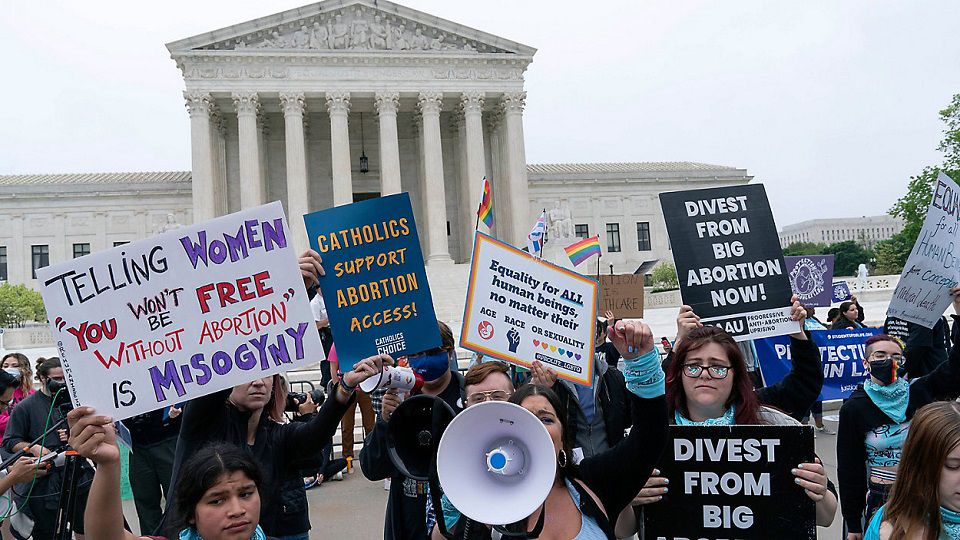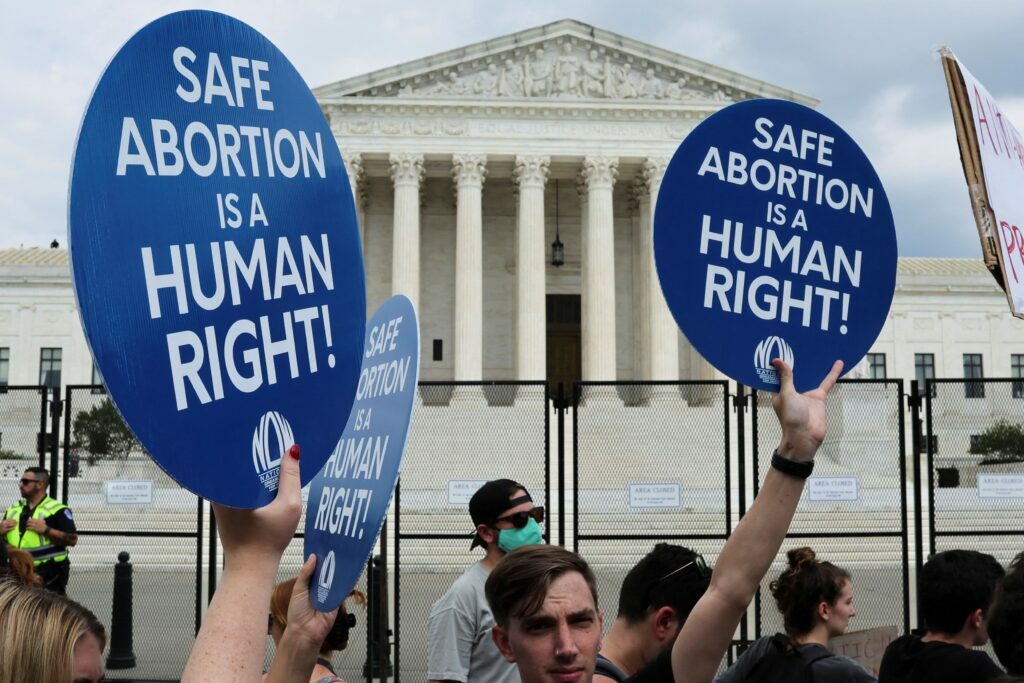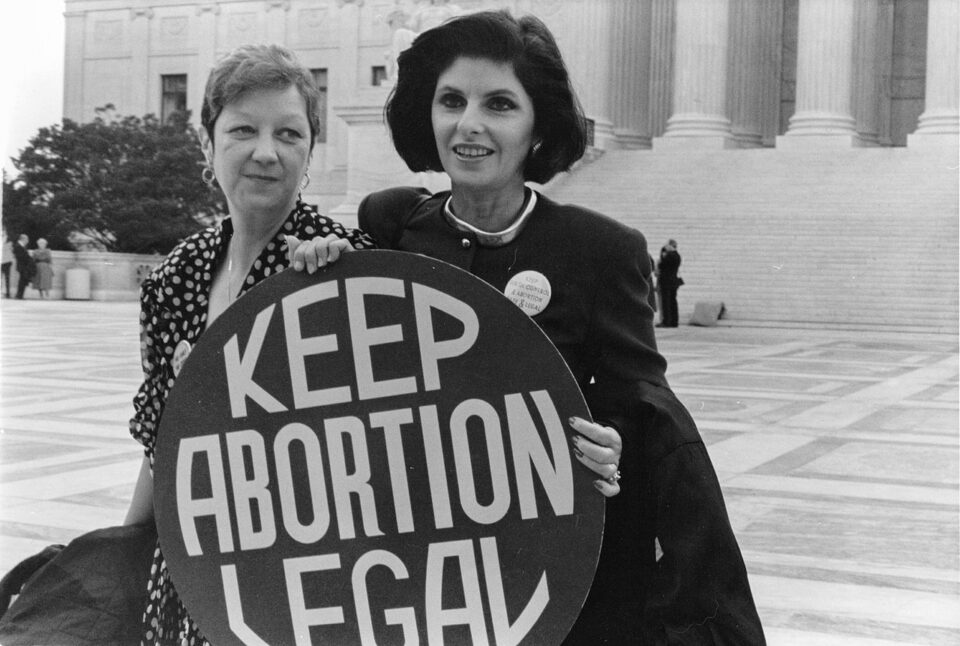On the 50th anniversary of Roe v. Wade, pro-abortion rights organizations promise to continue fighting while opponents of abortion rights protest in Washington.
In celebration of the overturning of Roe v. Wade, the historic Supreme Court decision that had guaranteed access to the procedure for decades across the US, anti-abortion protestors are marching in the nation’s capital.
The annual “March for Life” protest took place on Friday in Washington, DC, and was attended by pro-life organizations, conservative lawmakers, and religious institutions.
The event was held just a few days before the country will commemorate the exact 50th anniversary of the Roe v. Wade ruling, which made access to abortion a constitutional right nationwide in 1973.
The route of this year’s march, however, will end outside the US Capitol rather than at the Supreme Court, reflecting the anti-abortion rights movement’s changing priorities following the Roe decision’s overturning in June 2022.

Jeanne Mancini, head of the March for Life Education and Defense Fund, told the audience assembled in front of the Washington Monument on Friday afternoon, “We will march until abortion is unthinkable.”
According to Emily Yocum, executive director of Orthodox Christians for Life, “this is a historic year to be marching for life, because for the first time in 50 years, we are not just mourning the Roe v. Wade judgment, but celebrating its overturn.”
In June of last year, the conservative majority of the US Supreme Court overruled Roe v. Wade, enabling Republican-led states to quickly adopt abortion bans and restrictions.
Human rights activists criticized the decision, stating that it would prevent millions of people from accessing the treatment and that Black and low-income groups would be the most negatively impacted.
However, right-wing and religious groups applauded the decision as a significant victory in their years-long campaign to restrict access to abortion in the United States. Many of these groups have since turned their attention to even stricter regulations, including limiting the use of abortion pills.
For instance, Kristan Hawkins, president of Students for Life of America, a pro-life organization, recently disclosed to The Washington Post that she was meeting with Republican attorney generals to consider stopping the flow of the tablets.
The renewed effort comes as US President Joe Biden’s administration works to increase access to abortions in the face of the uncertainty brought on by Roe’s repeal. The US Food and Drug Administration said this month that it will let pharmacists to sell abortion drugs for the first time, a decision that was praised by rights organizations but condemned by Republicans.
Politicians who opposed abortion rights had already contributed to the adoption of hundreds of restrictions around the country before Roe was overturned. However, the Guttmacher Institute, a reproductive rights organization, reports that between the Supreme Court’s June decision and January 12 of this year, abortion was prohibited in 12 states “with extremely limited exceptions” and was not available in two more.
“Additionally, in the first 100 days following the Roe decision, at least 66 clinics in 15 states stopped offering abortion services, with many of them completely closing their doors. According to statistics from the Guttmacher Institute’s Liza Fuentes, 29 percent of all US women of reproductive age reside in states where abortion is either illegal or heavily regulated.
Advocates for reproductive rights have also expressed concern that anti-abortion rights organizations are advocating for harsher punishments for healthcare professionals who perform the operation. Republican Steve Marshall, the attorney general of Alabama, said last week that patients who obtain abortions may also face legal action.
Profound divisions
The post-Roe battle over abortion in the US is currently primarily focused on state legislatures and courts, but after November’s hotly contested midterm elections, it has also returned to the forefront at the federal level.
As polls indicated that access to abortion was high on many voters’ lists of priorities, Biden’s Democratic Party made preserving abortion rights a focal point of that election campaign. In response to the Supreme Court’s Roe ruling, Democratic-led states sought to strengthen protections, and five US states passed laws guaranteeing access to abortions during the midterm elections.
The Guttmacher Institute announced this month that “states predominantly in the West Coast and Northeast have approved 77 abortion protections, the largest number ever passed in one year.”
However, new abortion restrictions are also being proposed now that Republicans have a tenuous grasp on the House of Representatives. The Republican House Majority Leader Steve Scalise intends to reintroduce legislation that would outlaw abortion nationwide after 15 weeks of pregnancy, according to a report last week in The Washington Post. When that proposal might be made is not known.
Scalise told the crowd at the “March for Life” on Friday that seeing young people taking part in the demonstration was “very encouraging.” The congressman added, “Let’s keep fighting and let’s win this battle.”
In a resolution passed last week, House Republicans urged the Biden administration to “defend the rights of pro-life facilities, groups, and churches” and denounced attacks on anti-abortion facilities in the US. They also approved a law that would punish medical professionals and others who fail to treat newborns who were born alive following an attempted abortion.
The proposed measure, which has little chance of passing in the Democratic-controlled Senate, was criticized by reproductive rights organizations as “a manufactured scare tactic designed to stigmatize abortion.”
“Let’s be clear: The law already mandates that doctors provide appropriate medical treatment. This is not how health care functions. It is incorrect, reckless, and dangerous to imply differently, according to a statement from Jacqueline Ayers of the Planned Parenthood Federation of America.
Advocates for reproductive rights have vowed to keep fighting for abortion access even as they prepared to celebrate Roe v. Wade’s 50th anniversary this weekend with marches, panel discussions, movie screenings, and other activities.

The Women’s March, which is staging an event on Sunday with the slogan “Bigger than Roe” in Madison, Wisconsin, declared on its website that “we are not going gently.”
“We are bringing our battle to every state legislature and state house in this nation. If you come for our families, our liberties, or our future, we will be coming for your seat, the organization warned all lawmakers at all levels of government. “Our campaign is powerful. Our cause is expanding. Roe is not as huge as our movement.





